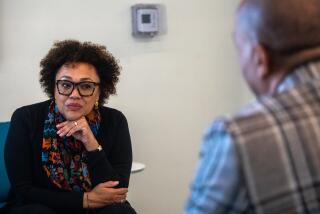SOUTH-CENTRAL : Media Watchdog Group Mobilizes
- Share via
Proclaiming that television networks are “recycling racist practices,” the Rev. Jesse Jackson urged South-Central community leaders last week to join him in building an organization to protect minorities’ interests in the media.
In a July 25 meeting and press conference at the African American Unity Center, Jackson said the newly formed Rainbow Coalition Commission on Fairness in the Media plans to encourage viewers to boycott networks that refuse to schedule programs with positive ethnic images or to place minorities in key decision-making positions.
Assemblywoman Marguerite Archie-Hudson (D-Los Angeles), who represents South-Central, was named chairwoman of the commission. Serving as co-chairs are Curtis Owens, executive director of the unity center; Ester Renteria, executive director of the National Hispanic Media Coalition, and Sumi Hari, president of the Assn. of Asian Pacific Artists. Eddie Wong, regional director of the Rainbow Coalition, was selected director of the commission.
“They think they have the right to not include us in recruitment, hiring, promotion, protection, decision-making,” Jackson said. “But we have the consumer power; we have viewer power; we have the power to change dials. We will do just that until there is change.”
Jackson said the commission has become increasingly concerned about what it sees as a significant lack of representation of African Americans, Latinos, Asian Americans, Native Americans and women among network news anchors, prime-time entertainment writing staffs and in prominent acting roles that do not portray criminal activity.
Owens emphasized the Unity Center’s ties to the community and the power networking has to make Jackson’s media campaign succeed. The center is part of a coalition of 60 nonprofit minority community organizations in Los Angeles.
“We will be able to bring the manpower necessary for the selective television viewing,” Owens said.
Tracy Spratt, a South-Central community leader and network coordinator at Genesis Food Distributors, which assists 97 churches, said the only way viewers will boycott is if they are educated enough to want to react.
“Unless you know what it is you’re fighting for, you can’t take action and expect if from anyone else,” she said.
One media observer said that although Jackson’s organization has legitimate complaints, boycotting is not always effective.
“It’s certainly part of democracy to boycott . . . and it’s fun to threaten,” said Joe Saltzman, a professor of journalism at USC. “But to make it work is actually a different story. It’s hard to show the public how shutting off their favorite television program is going to change public policy.”
However, Saltzman said, the networks are very sympathetic to these types of issues.
Jackson said the commission is researching the networks’ hiring practices and the portrayal of minorities. Findings will be presented at a September workshop.
“The networks have time now to get their houses in order. They can begin to change now,” he said.
More to Read
The biggest entertainment stories
Get our big stories about Hollywood, film, television, music, arts, culture and more right in your inbox as soon as they publish.
You may occasionally receive promotional content from the Los Angeles Times.










